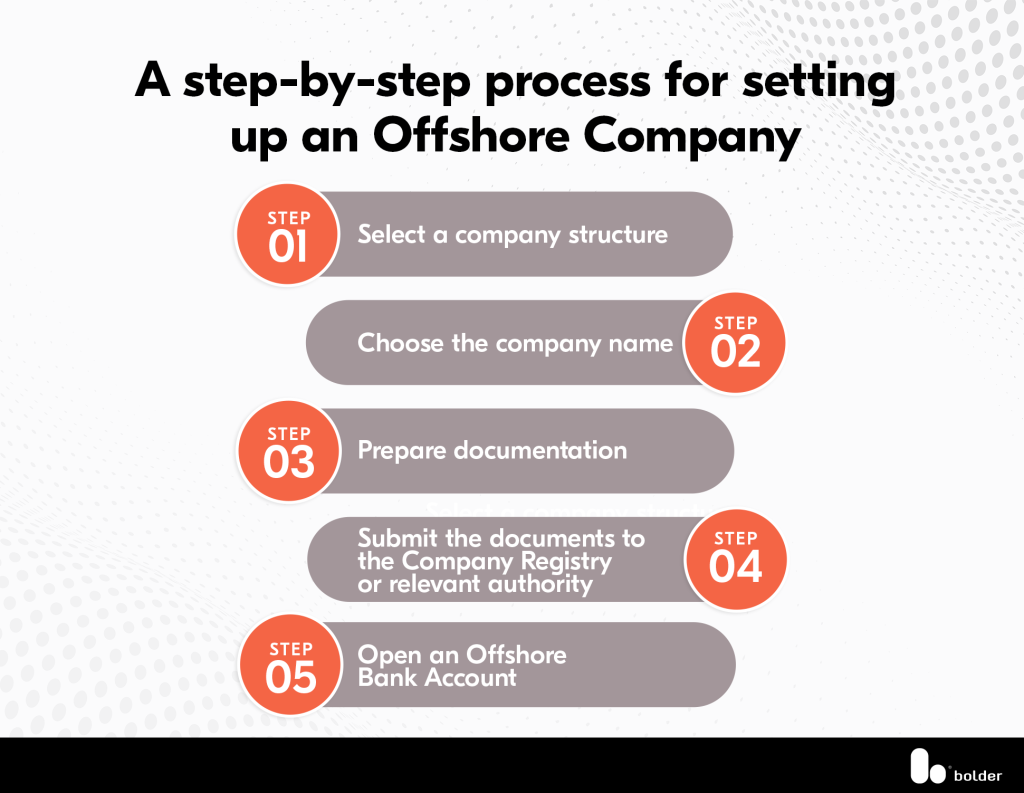How to Choose the Right Country for Offshore Company Formations
Wiki Article
Demystifying Offshore Company Formations: Exactly How They Operate and What to Expect
Offshore company formations can seem complex and enigmatic. Offshore Company Formations. These entities, usually developed for tax benefits and personal privacy, operate under special legal frameworks. Business owners might discover themselves steering through a labyrinth of laws and compliance demands. Understanding the complexities is crucial for success. What are the genuine benefits? What are the prospective challenges? A closer examination exposes the subtleties that can impact decision-making considerablyUnderstanding Offshore Firms: Meanings and Types
Offshore companies are entities developed in a territory beyond an individual's or business's primary nation of residence, usually for purposes connected to tax optimization, possession protection, or governing benefits. These companies can take different forms, including limited responsibility business (LLCs), international organization companies (IBCs), and offshore trust funds. Each kind offers details features and allures to various demands.Restricted liability companies supply proprietors with security from individual liability, while worldwide organization companies are preferred for their flexibility and marginal reporting demands. Offshore counts on, on the various other hand, are utilized mostly for estate preparation and asset defense.
The choice of jurisdiction greatly influences the firm's operations, as some places use much more desirable lawful frameworks and personal privacy defenses. Offshore Company Formations. Understanding the distinctions in between these kinds is vital for companies and individuals thinking about offshore frameworks, as each alternative carries various effects for administration and compliance
The Advantages of Establishing an Offshore Business
Establishing an overseas company can give numerous advantages, especially for those looking for to boost their economic strategies and secure their assets. One significant benefit is tax optimization; many jurisdictions offer positive tax rates or exemptions, enabling organizations to maintain even more earnings. In addition, overseas firms can supply a layer of personal privacy, shielding the identifications of proprietors and shareholders from public analysis.Another advantage is asset defense. By placing possessions in an overseas entity, individuals can secure their wealth from possible legal cases or political instability in their home nations. This structure likewise promotes global business procedures, making it possible for much easier access to varied clients and worldwide markets.
The facility of an offshore firm can improve trustworthiness and prestige, appealing to customers who value worldwide business techniques. In general, these benefits make offshore company formations an eye-catching choice for people and services intending for financial growth and safety.
Secret Considerations Prior To Creating an Offshore Entity
Before creating an offshore entity, a number of crucial variables should be evaluated. Legal conformity needs, tax implications and advantages, as well as territory choice, play a considerable role in the decision-making procedure. Understanding these factors to consider can help companies and people navigate the intricacies of overseas business formations effectively.
Lawful Conformity Requirements
When considering the development of an offshore entity, understanding lawful compliance demands is essential to assure adherence to both regional and global legislations. Possible company owner have to acquaint themselves with regulations regulating company enrollment, reporting responsibilities, and functional standards in the picked jurisdiction. This consists of validating the legal needs for supervisors and investors, along with guaranteeing compliance with anti-money laundering (AML) and know-your-customer (KYC) laws. In addition, organizations should remain familiar with any type of licensing needs details to their sector. Involving regional legal and economists can supply beneficial insights, guaranteeing that all necessary documents is prepared and sent correctly. Eventually, comprehensive understanding of lawful compliance helps mitigate dangers and promotes a lasting offshore procedure.Tax Implications and Benefits
Various local business owner take into consideration the tax obligation ramifications and benefits of creating an overseas entity as a crucial variable in their decision-making procedure. Offshore companies can offer substantial tax obligation advantages, such as reduced corporate tax obligation prices, exception from particular neighborhood tax obligations, and the capacity to delay taxes on foreign income. These advantages can bring about boosted productivity and cash money circulation, making overseas frameworks appealing for global organization procedures. Furthermore, the capacity for tax treaties may better reduce tax responsibilities. It is essential for business proprietors to recognize the intricacies included, including conformity with both international and regional tax guidelines. Engaging with tax obligation professionals is advisable to browse these intricacies properly and assure excellent tax planning methods.Jurisdiction Choice Variables
What aspects should one take into consideration when selecting a jurisdiction for overseas business formation? Secret considerations consist of tax effectiveness, regulatory setting, and political stability. Territories with beneficial tax obligation programs can significantly affect earnings. The governing landscape needs to offer flexibility and ease of compliance, permitting effective company procedures. Political security is crucial, as it ensures the security of possessions and continuity of procedures. In addition, the track record of the territory can affect client count on and organization relationships. Access to banking services and the availability of expert assistance services are additionally vital. Ultimately, understanding regional regulations regarding privacy, possession, and reporting demands is necessary to establish that the overseas entity lines up with the service proprietor's goals and legal responsibilities.The Process of Establishing an Offshore Firm
Setting up an overseas company includes a collection of tactical actions that require cautious preparation and compliance with global regulations. A private should pick an appropriate jurisdiction that lines up with their business purposes and uses favorable tax benefits. Adhering to territory choice, the next step is to select a special company name and prepare the needed paperwork, consisting of short articles of incorporation and investor contracts.When the paperwork is all set, it should be sent to the relevant authorities along with the called for fees. After approval, the business will certainly receive a certification of unification, officially developing its lawful existence. The private have to then open a corporate bank account to facilitate economic purchases.
Keeping an overseas business includes adhering to continuous conformity requirements, such as annual coverage and tax responsibilities, which vary by jurisdiction. Understanding each step is vital for an effective overseas company formation.

Regulative and lawful Structure for Offshore Firms
While developing an offshore company can use considerable benefits, it is necessary to maneuver via the intricate lawful and regulative framework that governs such entities. Each territory has its very own collection of legislations that dictate everything from company formation to taxation and conformity needs. These guidelines are designed to stop unlawful activities, such as cash laundering and tax evasion, and typically need extensive documents and openness.Secret elements of this structure include the need of assigning neighborhood supervisors, maintaining a licensed office, and adhering to yearly reporting commitments. Additionally, numerous territories enforce particular licensing requirements for sure organization activities. Understanding these lawful terms is vital for making certain compliance and mitigating threats connected with penalties or legal conflicts. Engaging with legal specialists that specialize in offshore business can assist in maneuvering with this detailed landscape, inevitably facilitating a successful and certified offshore company procedure.
Typical Misconceptions Regarding Offshore Firms
Many individuals hold false impressions concerning overseas business, commonly relating them with tax obligation evasion and unlawful activities. It is important to recognize that these entities can operate legitimately within a structure created for reputable organization methods. Clearing up the legal standing of overseas business can aid resolve these misconceptions and promote a much more exact understanding of their purpose.Tax Evasion Myths
Despite the expanding popularity of offshore firms, false impressions regarding their usage for tax evasion persist. Many individuals incorrectly believe that establishing an offshore entity is entirely a way to stay clear of taxes. Overseas business are frequently made use have a peek at this site of for legitimate functions, such as asset defense, international company growth, and financial investment diversity. The assumption that all offshore activities relate to illegal tax evasion neglects the complexities of international tax policies and compliance demands. In addition, the huge bulk of offshore territories have implemented actions to fight tax evasion, promoting openness and info exchange. This mischaracterization can deter legit organizations and capitalists from exploring the prospective advantages of overseas business formations while perpetuating a negative preconception bordering these entities.Legal Standing Clarified
The lawful status of overseas firms is commonly misunderstood, resulting in a variety of misconceptions. Lots of think these entities operate in a legal gray location, assuming they are naturally illegal or underhanded. Actually, offshore firms are genuine companies formed under the regulations of particular territories, created for different reasons, including asset defense and market development. Another common misunderstanding is that offshore companies evade tax obligations totally; nonetheless, they go through the laws and tax obligations of their home nations. In addition, some people assume that overseas business can be easily made use of for money laundering or prohibited tasks. While abuse can happen, many territories impose rigorous conformity and transparency legislations to minimize such threats, making sure that offshore firms run within legal frameworks.
Handling and Operating Your Offshore Company Successfully
Effectively managing and operating an offshore firm calls for a calculated strategy that stabilizes conformity with regional laws and the quest of business goals. Effective offshore management includes recognizing the jurisdiction's tax obligation regulations, reporting needs, and functional guidelines. Utilizing neighborhood professionals, such as accounting professionals and lawful advisors, can offer vital insights right into passing through these complexities.Additionally, developing clear interaction channels and functional methods is essential for maintaining performance. Making use of technology for job management and collaboration can boost efficiency, while normal efficiency assesses guarantee placement with calculated purposes.
Preserving durable economic records is important, as transparency promotes trust fund with stakeholders and complies with global requirements. Finally, being versatile to changes in regulations or market problems enables offshore firms to pivot properly, assuring long-lasting sustainability and development. By sticking to these principles, entrepreneur can make best use of the advantages of their offshore endeavors while mitigating risks.
Regularly Asked Concerns
Just how much Does It Price to Preserve an Offshore Firm Each Year?
The expense to maintain an offshore company yearly differs substantially, normally varying from $1,000 to $5,000, relying on jurisdiction, solutions required, and conformity responsibilities. It is necessary to take right into account additional costs for details requirements.Can I Open a Bank Account for My Offshore Business Remotely?
Opening up a financial institution account for an offshore business from another location is usually possible. Demands may vary by territory, usually demanding documentation and verification processes, which can complicate the remote application experience for people.Exist Certain Nations Known for Easier Offshore Company Formations?
Specific nations, such as Belize, Seychelles, and the British Virgin Islands, are renowned for their streamlined processes and beneficial policies relating to offshore firm developments, drawing in entrepreneurs looking for performance and confidentiality in organization procedures.
What Sorts of Companies Are Best Matched for Offshore Business?
Certain organizations, such as working as a consultant, investment, and shopping firms, usually take advantage of Extra resources offshore business due to tax benefits, privacy, and governing versatility - Offshore Company Formations. These entities generally grow in jurisdictions that advertise positive business settingsHow Can I Make Certain Compliance With Regional Regulations When Running Offshore?
To guarantee conformity with local legislations when running offshore, it is vital to involve legal professionals, perform comprehensive study on jurisdiction laws, and keep transparent monetary documents, thereby reducing threats click this link related to non-compliance.
Report this wiki page